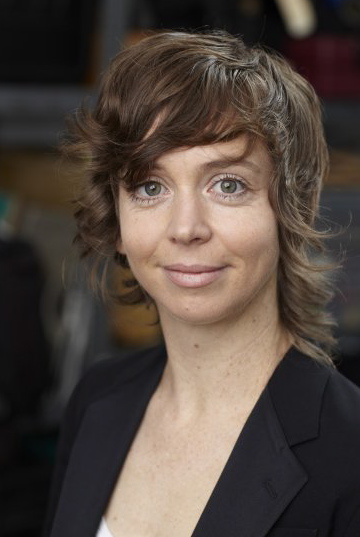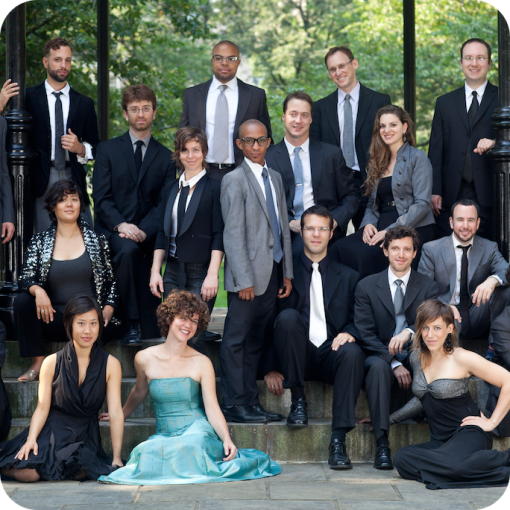Marking its tenth anniversary, ICE looks to expand its new-music cool
The International Contemporary Ensemble has never been afraid of thinking big. Plans now in the works include satellite locations, commissions that are played simultaneously in different countries, and residences everywhere from Qatar to Paris, said Rebekah Heller, a bassoonist in the ensemble.
And then there are the really ambitious conversations. “There are also talks about us going to outer space,” said Heller. “I’m totally not joking.”
Which raises another question. “Outer space would be pretty cool,” said Heller. “But where do you go from there?”
Here on Earth, it’s been a good year for the International Contemporary Ensemble, better known as ICE. This season, the ambitious, high-energy new-music group is celebrating its tenth birthday. In those ten years, they’ve grown from a budget of $603 to over a million dollars, and have commissioned over 500 new works along the way. This year they have a season of 65 concerts planned, performing in 10 states and five countries. They’ve completed a residency in Brazil, and are about to inaugurate a series in Berlin. In October, flutist Claire Chase, the ensemble’s artistic director and CEO, was awarded a MacArthur fellowship, which provides a no-strings-attached $500,000 over five years. ICE is currently looking towards expansion: more concerts, more commissions and the idea of satellite locations, so that the organization can exist simultaneously in different cities. The ensemble currently counts New York and Chicago as homes, and sees expanding to a site on the west coast as a priority, Chase said.

Chase, who is 34, founded the group ten years ago. She has a way of articulating ideas just on the cusp of crazy in way that seems grounded and thoughtful. Her desire to expand comes from what she calls her “creative restlessness,” she said. “I want to perform not just great concerts, but to produce a large volume of them,” she said. “I want to put contemporary music on the map, by developing not just in isolation but en masse.” ICE’s concerts range from full-ensemble productions to solo recitals by just one member of the group.
In the next two or three years, she said, she’d like to see the ensemble playing 100 concerts a season. “That’s where we will be creatively the most satisfied and fulfilled and ignited,” she said. “That would enable us to have strong presences here as well as satellite locations all over the world.”
When asked how she will maintain artistic quality, Chase said it that won’t be a problem. “Paradoxically, this expansion provides more opportunities to grow into a higher quality of music making,” she said. “We have more opportunities to refine what we’re doing.”
Heller, the bassoonist, agreed that quality is not an issue. “My first concert with ICE was in New York in 2007, and I was just instantly bowled over by the level of commitment to every single note,” she said. “Because we trust each other so much, we are able to produce shows where two or three people are involved and doing everything.”
Some of the idea of satellite locations isn’t just about concerts, but access to the creative process, said program director Joshua Rubin, who is also a clarinetist in the ensemble. “We want to create this for an audience in a place where we can invite people in for free, and people can feel free to come and go and watch what we’re doing,” he said.
At the end of November, ICE will use this concept in a gallery in Berlin [http://iceorg.org/events/event/CONCERT-ice-in-berlin]. For three days, ICE will install themselves in a gallery space, and people can come and view the ensemble at work, doing different activities in different rooms. “There’s no schedule, so they don’t know when a performance will happen,” said Heller, the bassoonist. “We encourage people to bring food or booze or scores and insert themselves into the process.”
ICE will also continue to expand two of its current initiatives, DigitICE [http://iceorg.org/digitice] and ICElab [http://iceorg.org/icelab]. DigitICE is an online library of unedited live concert footage, and ICElab is a program in which the ensemble members work intensely with young, lesser-known composers.
“ICElab is the only vehicle that really treats performers and composers as absolutely equal collaborators,” said Marcos Balter, a Chicago-based Brazilian composer who participated in ICElab, and continues to have a relationship with the ensemble. The performers work as closely as possible with the composers, there is space to try new things before presenting publically and there are open workshops where you can collect ideas, said Balter.
“It’s such a hard thing to find in collaborative partners, this lack of fear and sense of approaching ideas without worrying if they are even possible to realize,” he said. “The cool thing is that they always do, and the final idea is a huge surprise and enormously rewarding.”
Things this expansion won’t include are a larger ensemble, a touring repertoire or commercial management, Chase said. She believes in an “artist-driven” model, and despite many offers of commercial management, said management isn’t a good fit for ICE. “Strategically we have to constantly be thinking outside of the box, and that’s not part of commercial management structures,” she said. Both Chase and Rubin, the program director, are members of the ensemble, and ensemble members are actively involved in concert planning and administrative work.
As for the MacArthur, Chase isn’t ready to say what she’ll do with the money, but promises to keep it in the artistic community. “I’m not going to buy a car or a house or a flute,” she said, laughing. “I want the award to kindle ideas that are risky and wouldn’t happen otherwise.”
Next up for ICE are concerts in New York on December 6 and Chicago on December 8. In New York, the ensemble will perform two large works by composer Olga Neuwirth at Columbia’s Miller Theatre. The Chicago concert, held at the Museum of Contemporary Photography, is a free concert featuring the works of four young Brazilian composers. Balter, the composer, will MC the concert.
“The idea that we can have the whole band on stage doing a major voice one night, and then a couple days later do this funky concert with composers that are at the borderlines is fantastic,” Chase said.
“It keeps us fresh, and keeps us on our toes.”
ICE will perform Marcos Balter’s Passará, Edgewater, and Descent from Parnassus; Alexandre Lunsqui’s Topografia de Um Caminho Andado; Felipe Lara’s à liberdade; and Arthur Kampela’s Not I at 7:30 p.m. December 8 at the Museum of Contemporary Photography, 600 S. Michigan Avenue. [http://iceorg.org/events/event/passara-ice-at-mocp.
Corinne Ramey is a journalist and violist based in New York City. She has written for publications including NYTimes.com, Strad Magazine, Strings Magazine, WQXR.org, CityArts, The Forward and the NY Daily News. Originally from Dayton, Ohio, Cory holds degrees in comparative literature, viola performance and journalism from Oberlin College and Conservatory and Columbia University.
Posted in Articles



